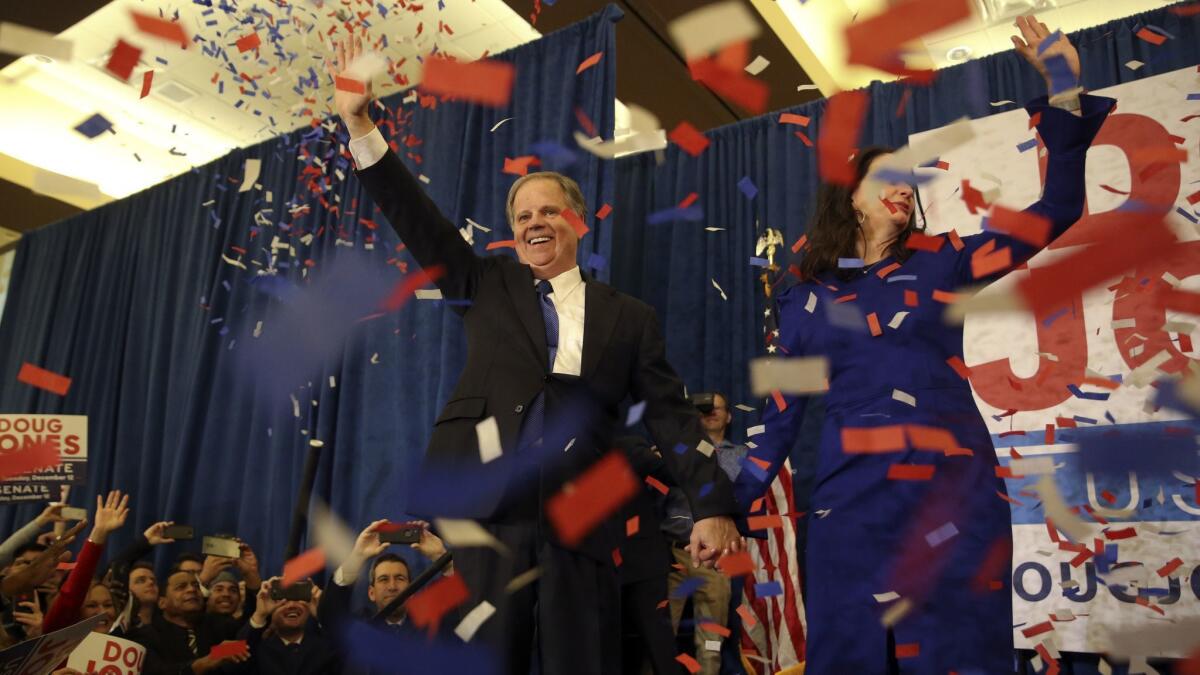Editorial: Online disinformation isn’t just for Russia anymore

- Share via
With the conspicuous exception of President Trump and some of his supporters, Americans were appalled when it was revealed that Russian “troll farms” had launched a disinformation campaign on social media designed to influence the 2016 election. But online deception about elections is detestable even when it originates inside this country, as it apparently did in a 2017 special election for a U.S. Senate seat from Alabama.
The New York Times reported Monday that progressive Democrats opposed to Roy Moore, the odious Republican candidate in that race, created a Facebook page and Twitter feed purporting to represent Moore supporters opposed to the sale of alcoholic beverages. The convoluted strategy behind the “Dry Alabama” campaign was to associate Moore with calls for a statewide ban on the sale of liquor in order to alienate moderate, pro-business Republicans and help Democratic candidate Doug Jones. (Jones, who says he had no idea that the deception was underway on his behalf, was narrowly elected.)
“Dry Alabama” was actually the second case of Russian-style disinformation in the Alabama campaign uncovered by the New York Times. In December it reported on an “experiment” in which a phony Facebook page was created to try to drain support for Moore from conservatives and a “false flag” operation was created to suggest that the Republican candidate was being followed on Twitter by Russian bots.
Enter the Fray: First takes on the news of the minute from L.A. Times Opinion »
Ironically, one of the participants in that project was Jonathon Morgan, the chief executive of New Knowledge, a cyber security firm that compiled a report on Russian disinformation for the Senate Intelligence Committee. Morgan said that his intention was to understand the mechanics of disinformation tactics, not to affect the outcome of the election. But the New York Times quoted an internal report saying that the project sought to “enrage and energize Democrats.”
The architects of “Dry Alabama” made no apology for trying to influence the election. Matt Osborne, a progressive activist who worked on the project, told the New York Times that while he hoped that deceptive tactics would someday be banned from American politics, in the meantime Democrats “cannot unilaterally give it up.”
That’s ludicrous. Misleading voters is not just another campaign tactic. It’s a corruption of democracy.
Jones, the supposed beneficiary of these efforts, sees things more clearly. After the first report of online disinformation, the senator said that he was outraged. He has called for investigations by the Federal Election Commission and the Justice Department to see whether any laws were violated.
Even if they weren’t, this sort of deception is entirely unacceptable, whether practiced by Republicans, Democrats or Russians. Candidates should follow Jones’ lead in disavowing it.
Follow the Opinion section on Twitter @latimesopinion and Facebook
More to Read
A cure for the common opinion
Get thought-provoking perspectives with our weekly newsletter.
You may occasionally receive promotional content from the Los Angeles Times.









